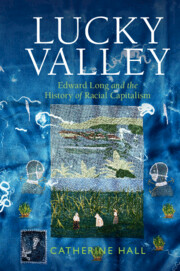
- Publisher:
- Cambridge University Press
- Online publication date:
- January 2024
- Print publication year:
- 2024
- Online ISBN:
- 9781009106399


Why does Edward Long's History of Jamaica matter? Written in 1774, Long's History, that most 'civilised' of documents, attempted to define White and Black as essentially different and unequal. Long deployed natural history and social theory, carefully mapping the island, and drawing on poetry and engravings, in his efforts to establish a clear and fixed racialized hierarchy. His White family sat at the heart of Jamaican planter society and the West India trade in sugar, which provided the economic bedrock of this eighteenth-century system of racial capitalism. Catherine Hall tells the story behind the History of a slave-owning family that prospered across generations together with the destruction of such possibilities for enslaved people. She unpicks the many contradictions in Long's thinking, exposing the insidious myths and stereotypes that have poisoned social relations over generations and allowed reconfigured forms of racial difference and racial capitalism to live on in contemporary societies.
‘Once in a while a big book comes along that compels you to drop everything, clear your schedule and focus intently. Lucky Valley is a publication event, a magnificent counterhistory of racial capitalism and an urgent call by one of the preeminent historians of our time to dismantle and redress the enduring injustices of Edward Long’s world.’
Vincent Brown - author of Tacky’s Revolt: The Story of an Atlantic Slave War
‘Catherine Hall has brilliantly unearthed the crucial context of Edward Long’s entanglement in the business of slavery, one in a long line of planters in England’s colonial establishment in Jamaica. Hall’s penetrating, extremely well-researched work is a major contribution to our ongoing struggle to dismantle the devastating, and intellectually dishonest, attempts to justify slavery by debasing those most brutally entrapped by it. Lucky Valley is an original and delightfully readable contribution to understanding the troubling discourse of intellectual racism.’
Henry Louis Gates Jr - author of The Black Box: Writing the Race
‘In Lucky Valley perhaps the most important historian of our age explains how the ‘father of English racism’ described an entire socio-economic and ecological system constructed around racial oppression and provided generations of Britons with a justification for it. Edward Long’s advocacy has reverberated perniciously through the past two and a half centuries, adapted to support new and proliferating forms of racism. In this magisterial and moving analysis, Hall locates the greed, privilege, hubris and anxiety that underpinned it.’
Alan Lester - author of Ruling the World and Deny and Disavow: The British Empire in the Culture War
‘Catherine Hall’s study of Edward Long’s life and influence is indispensable. While the work is a careful, detailed examination of Long and his family, it is much more than a biography. Hall situates Long as a crucial architect of racial capitalism and clarifies the importance of his role in crafting a worldview in which slavery and slave ownership were at the very centre of modernity and empire. Hall’s brilliance as a scholar of history, race and gender is well established. In Lucky Valley it is deployed in a work that will stand as the definitive study of slavery –its victims and its champions—during the long eighteenth century.’
Jennifer L. Morgan - author of Reckoning with Slavery: Gender, Kinship, and Capitalism in the Early Black Atlantic
‘Reading through the lens of one exemplary figure and text of the eighteenth-century British slave empire, Catherine Hall's Lucky Valley:, Edward Long and the History of Racial Capitalism, is a critical inquiry into both the exploitative structure of racial capitalism and the perversity of the racial imagination that aimed to rationalize its unjust enrichment and disavow its inhumanity. Hall's subtle and incisive intervention is grist for the mill of a contemporary reparatory project.’
David Scott - author of Omens of Adversity: Tragedy, Time, Memory, Justice
 Loading metrics...
Loading metrics...
* Views captured on Cambridge Core between #date#. This data will be updated every 24 hours.
Usage data cannot currently be displayed.